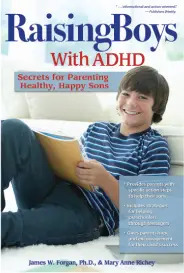Boys with ADHD often have low self-esteem and feel nervous about school-related tasks, such as taking a test or being called on by the teacher. Having low self-esteem makes it difficult to make decisions and some boys with ADHD find it challenging to make simple decisions. Authors of “Raising Boys with ADHD” provide advice on how to help boys with ADHD build their self-esteem.
Think about your son’s self-esteem. Does he appear to feel good about himself, or is he down in the dumps? When we complete an evaluation with clients, we believe it is important to assess a boy’s self-esteem as part of the total process. We believe that if a boy has low self-esteem, then it permeates all areas of his life. Some psychologists do not ask specifically about self-esteem; if you work with a psychologist, our recommendation is to choose one who will assess your son’s self-esteem at the onset.
 If your son’s self-esteem appears solid, you are fortunate. His self-esteem will help provide him with the confidence he needs to navigate life. Continue to nurture his self-esteem, because it can give him a sense of resiliency, which he’ll need to bounce back when he has a setback or challenge. It will allow him to stand up, brush himself off, and try again. This is an invaluable quality to develop.
If your son’s self-esteem appears solid, you are fortunate. His self-esteem will help provide him with the confidence he needs to navigate life. Continue to nurture his self-esteem, because it can give him a sense of resiliency, which he’ll need to bounce back when he has a setback or challenge. It will allow him to stand up, brush himself off, and try again. This is an invaluable quality to develop.
How ADHD in Boys Can Affect Self-Esteem
The self-esteem of many boys with ADHD is low. It can become low because of repeated failures, constant reprimands from adults, teasing from peers, or just because of the way he is wired. What we call “global self-esteem” comprises your son’s behavioral, anxiety, popularity, physical, and general satisfaction-in-life self-esteem. You may find your son’s self-esteem is high in one area and lower others.
In our experience, boys with ADHD often have low behavioral self-esteem, which means your son knows he frequently gets in trouble. We also find that many boys with ADHD have lower anxiety self-esteem, which implies that they feel nervous about school-related tasks such as taking a test or being called on by the teacher. They act up in school and become the class clown to try to build confidence by making people laugh.
Low self-esteem stifles decision-making ability. Some boys with ADHD can’t make even the simplest decisions. If your son thinks poorly of himself, then over time he may become anxious, frustrated, or depressed. These depressed thoughts create depressed actions, which lead to poor performance. Unchecked, it can become a difficult cycle to end.
How Parents Can Help Increase Their Son’s Low Self-Esteem
If your son has low self-esteem, his automatic reaction to a new task that appears challenging is probably, “I can’t.” For many boys with ADHD, this “I can’t” attitude turns into what professionals call “learned helplessness.” Your son learns that it benefits him to become helpless. This develops over a period of time, because when your son automatically says, “I can’t,” many parents and teachers spring to complete the task for him.
What you must do is determine if your son’s problem is an “I can’t” or an “I won’t” type of problem. This allows you to decide how quickly you should step in to help. If it is an “I won’t” problem, then you need to wait and let him try to work through it on his own. If the problem is “I can’t,” then you should step in, provide instruction, and step away to let him try. You want to do this to teach your son an “I can and I will” attitude.
You can help strengthen your son’s self-esteem by affirming him in front of others. So often we reprimand and correct our son around other people, but we affirm him much less. Regardless of his age, your son needs to hear your encouragement and positive reinforcement, and he needs others to hear you giving it to him. He needs to hear you say statements like, “I’m proud of you. Your performance was awesome. You have a great heart. I love you.”
If parents don’t affirm their son in this way, then he will find another way to get that affirmation, usually from peers or by smoking, drinking, or engaging in other dangerous behaviors. Build your child up by telling family or friends a positive story about him, send them an email with a photo or a great story about him, or simply send him a note in his lunch box that he can read.
How to Navigate Challenges with Self-Esteem
The elementary years will likely be challenging for you and your son. The demands of school shine a new spotlight on his deficits in executive functioning skills and his difficulties with behavior, focus, and attention. Do you recognize these weaknesses?
Your son needs you to be involved at school to advocate for him and to work with his teachers to create interventions that will help him succeed at this critical time in his life. Remember: Your son is different from every other boy with ADHD, so he requires interventions tailored to his needs.Throughout everything, be sure to keep a problem-solving perspective, seek professional help when necessary—and, of course, never give up.
 James W. Forgan, Ph.D., is a parent of a young son with ADHD and a licensed school psychologist. Mary Anne Richey, M.S., is a parent of an adult son with ADHD and a licensed school psychologist. This article was reprinted from their book “Raising Boys with ADHD: Secrets for Parenting Healthy, Happy Sons“ (©Sourcebooks 2012).
James W. Forgan, Ph.D., is a parent of a young son with ADHD and a licensed school psychologist. Mary Anne Richey, M.S., is a parent of an adult son with ADHD and a licensed school psychologist. This article was reprinted from their book “Raising Boys with ADHD: Secrets for Parenting Healthy, Happy Sons“ (©Sourcebooks 2012).
Also read:





















